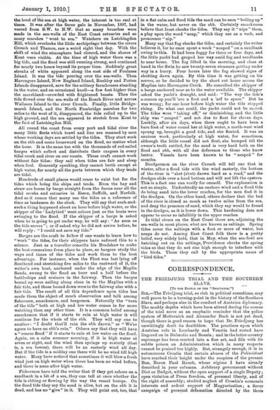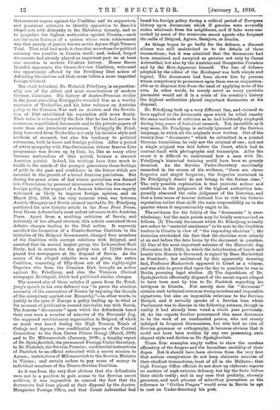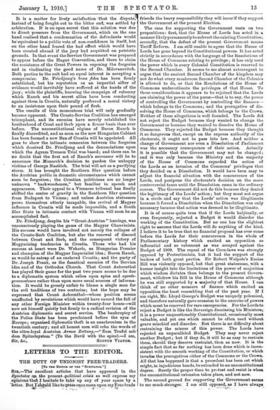CORRESPONDENCE.
THE FRIEDJUNG TRIAL AND THE SOUTHERN SLAYS.
[To THE EDITOR OF THE " SPECTATOR...1
SIU,—The Friedjung trial, so rich in political sensations, may well prove to be a turning-point in the history of the Southern Slays, and perhaps also in the conduct of Austrian diplomacy. The muddy depths which have been stirred during the course of the trial serve as an emphatic reminder that the police system of Metternich and Alexander Bach is not yet dead, though there is good reason to hope that Dr. Friedjung has unwittingly dealt its deathblow. The practices upon which Austrian rule in Lombardy and Venetia had rested have lingered on in Dalmatia and Bosnia ; and in the latter country espionage has been erected into a fine art, and fills with its subtle poison an Administration which in many respects cannot be praised too highly. But, strangely enough, it is in autonomous Croatia that certain abuses of the Polizeistaat have reached their height under the auspices of the present Ban, Baron Paul Rauch, whose regime I have already described in your columns. Arbitrary government without Diet or Budget, without the open support of a single Deputy; open violation of Press freedom, of personal liberty, and of the right of assembly; studied neglect of Croatia's economic interests and ardent support of Ma.gyarisation ; a fierce campaign of personal defamation directed by the three
Government organs against the Coalition and its supporters, and persistent attempts to identify opposition to Ranch's illegal acts with disloyalty to the Habsburg dynasty, and so to prejudice the highest authorities against Croatia,—such are the main features of a system whose main achievement was that parody of justice known as the Agram High Treason Trial. That trial had made it clear that no redress for political calumny was possible in Croatia itself ; and, indeed, forged documents had already played an important part on at least one occasion in modern Croatian history. Hence Baron Ilauch's opponents, the Croato-Servian Coalition, welcomed the opportunity offered by the Friedjung libel action of defending themselves and their cause before a more impartial foreign tribunal.
The chief defendant, Dr. Heinrich Friedjung, is unquestion- ably one of the ablest and most conscientious of modern German historians. His history of Austro-Prussian rivalry in the years preceding Koniggriitz revealed him as a worthy successor of Treitschke, and his later volumes on Austrian policy in the Crimean War and on Austria and the Revolu- tion of 1848 established his reputation still more firmly. Their value is enhanced by the fact that he has had access to numerous unpublished documents and to the private papers of more than one prominent statesman. Unhappily Dr. Fried- it:mg borrowed from Treitschke not only his incisive style and methods of research, but also his tendency to political extremism, both in home and foreign politics. After a period of active sympathy with Pan-Germanism (whose famous Linz programme was drawn up by him), he, like so many other German nationalists of that period, became a staunch Austrian patriot. Indeed, his writings have done much to kindle in the minds of the younger generation those feelings of pride in the past and confidence in the future which are essential to the growth of a broad Austrian patriotism. But during the great crisis of last winter patriotism was fanned into Chauvinism by personal intercourse with the directors of foreign policy, the support of a famous historian was eagerly welcomed as likely to impress foreign opinion, and on March 25th, 1909, at the very moment when war between Austria-Hungary and Servia seemed inevitable, Dr. Friedjung published his now historic article in the Hese Freie Presse, then Baron Aehrenthal's most ardent advocate in the Austrian Press. Apart from a scathing criticism of Servia, and indirectly of her alleged abettors, this article contained three definite charges leading to the libel action. It expressly ascribed the formation of a Croato-Servian Coalition to the initiative of the Belgrad Government, charged four members of the Coalition with corrupt relations with Belgrad, and asserted that its second largest group, the Independent Serb Party, had in return for the paltry sum of 12,000 francs placed five newspapers at the disposal of Servia. As the names of the alleged culprits were not given, the entire Coalition, consisting of fifty-three out of the eighty-eight Deputies who form the Croatian Diet, brought an action against Dr. Friedjung, and also the Viennese Clerical newspaper Reiehspost, which had published similar charges.
The avowed aim of these articles (I quote from Dr. Fried- jung's speech in his own defence) was "to prove the absolute necessity of the annexation of Bosnia by exposing the threads of the conspiracy against our Monarchy,"—in other words, to justify in the eyes of Europe a policy leading up to what at the moment of publication seemed inevitable war with Service. The famous " documents " upon which the defendants based their case were a number of minutes of the Slovenski Jug, the supposed revolutionary organisation in Belgrad, of which so much was heard during the High Treason Trials of Cetinje and Agram; two confidential reports of its Central Committee to the then Crown Prince Georgi (March, 1903) and to Dr. Milovanovitch (January, 1909); a lengthy report of Dr. Spalajkovitch, the permanent Foreign Under-Secretary, to Dr. Pashitch, the Servian Premier; confidential instructions of Pashitch to an official entrusted with a secret mission to Agram ; instructions of Milovanovitch to the Servian Minister in Vienna ; and certain orders to pay sums of money to individual members of the Croato-Servian Coalition.
As it was from the very first obvious that the defendants were not in a position to gain access to the Servian secret archives, it was impossible to conceal the fact that the documents had been placed at their disposal by the Austin- Hungarian Foreign Office, and that Count Aehrenthal had based his foreign policy during a critical period of European history upon documents which if genuine were avowedly stolen wholesale from his neighbours, and if false were con- cocted by some of the numerous secret agents who frequent the cafes of Belgrad, Agram, Sarajevo, or Semlin.
As things began to go badly for the defence, a discreet silence was still maintained as to the details of these transactions ; but it was admitted that the documents had been examined and accepted as genuine not only by Count Aehrenthal, but also by the Austrian and Hungarian Premiers and by the Heir-Apparent himself. The line of defence adopted by the editor of the Reichspost was both simple and logical. The documents had been shown him by persons whose competency to pronounce upon them was so unquestion- able as to dispense him from the need of applying tests of his own. In other words, he merely acted as every patriotic journalist would act if in a crisis of his country's history the highest authorities placed important documents at his disposal.
Dr. Friedjung took up a very different line, and claimed to have applied to the documents upon which he relied exactly the same methods of criticism as he had habitually employed during long years of historical research. Yet, incredible as it may seem, Dr. Friedjung is entirely ignorant of the Servian language, in which all the originals were written. Out of the twenty-four " documents " which he submitted in a printed German translation, he only saw the original of one ; and not a single original was laid before the Court, which had to content itself with photographs and transcripts. After the event it is difficult to understand bow a man with Dr. Friedjung's historical training could have been so grossly deceived. As the Servian Under-Secretary caustically remarked in the course of his evidence, "there are clever forgeries and stupid forgeries ; the forgeries contained in Dr. Friedjung's dossier do not belong to the former class." The only possible explanation is that patriotic ardour and confidence in the judgment of the highest authorities tem- porarily obscured the calm judgment of the historian, and that a keen sense of honour induced him to risk his historic reputation rather than shift the main responsibility on to the quarter where it unquestionably ought to lie.
The evidence for the falsity of the " documents " is over- whelming; but the main points may be briefly summarised as follows. (1) The only document which Dr. Friedjung actually saw refers to "material assistance" to be sent to the Coalition leaders in Croatia in view of " the impending elections " ; the historian overlooked the feet that the elections were already at an end before the date borne by the document in question. (2) One of the most important minutes of the Slovenski Jug (November 3rd, 1908), in which the introduction of bands and bombs into Bosnia is discussed, is signed by Bozo Markovitch as President; but undeterred by this apparently damning fact, Professor Markovitch appeared in Court as a witness, and was able to prove that upon the day in question be was in Berlin pursuing legal studies. (3) The depositions of Dr. Spalajkovitch effectually disposed of the secret report alleged to have been sent by him to Dr. Pashitch regarding his intrigues in Croatia. Not merely does the " document" contain such technical errors as wrong numbers and impossible signatures, but also an impossible reference to the Servian Bridget, and it actually speaks of a Servian loan which Parliament was to discuss in the following autumn, though in reality it had already been voted a whole year previously. (4) As the experts further pronounced this same document to be the work of an uneducated person, who not merely indulged in frequent Germanism, but who had no idea of Servian grammar or orthography, it becomes obvious that it could not have been written by any one possessing such elegant style and diction as Dr. Spalajkovitch.
These four examples amply suffice to show the careless effrontery of the forgers and the boundless credulity of their dupes. But it should have been obvious from the very first that serious conspirators do not keep elaborate minutes of their shadiest transactions, least of all in the Balkans ; that high Foreign Office officials do not draw up elaborate reports on matters of such extreme delicacy, but lay the facts before their chiefs orally; and in any case that prolixity, slovenly grammar, and such phrases of schoolboy journalism as the reference to " Golden Prague" would even in Servia be apt to cost an Under-Secretary his post. The results of this momentous trial will only gradually become apparent. The Croato-Servian Coalition has emerged triumphant, and its enemies have merely established the brotherhood of Croat and Serb upon a firmer basis than ever before. The unconstitutional regime of Baron Ranch is finally discredited, and as soon as the new Hungarian Cabinet has been formed a new Ban of Croatia will be appointed. All goes to show the intimate connexion between the forgeries which deceived Dr. Friedjung and the denunciations upon which the Agram Treason Trial was based; and there can be no doubt that the first act of Rauch's successor will be to announce the- Monarch's decision to pardon the unhappy victims of George Nastitch.. The trial will act as a purifying storm. It has brought the Southern Slav question before the Austrian public in dramatic circumstances which cannot soon be forgotten ; the Croatian politicians are no longer unknown " backwoodsmen," but familiar in speech and appearance.. Their appeal to a Viennese tribunal has finally shifted the centre of gravity in the Southern Slav question from Budapest to Vienna; and unless Austrian statesmen prove themselves utterly incapable, the revival of Magyar influence in Croatia will be made impossible, and a South Slav State in intimate contact with Vienna will soon be an accomplished fact.
Dr. Friedjung, despite his "Great-Austrian" leanings, was unconsciously playing the game of the Magyar Chauvinists. His success would have involved not merely the collapse of the Croato-Serb Coalition, but also the renewal of discord between Croat and Serb, and the consequent victory of Magyarising tendencies in Croatia. Those who had his success at heart were Dr. Wekerle, as Hungarian Premier and champion of the Magyar Imperialist idea ; Baron Ranch, as would-be satrap of an enslaved Croatia; and the party of Dr. Joseph Frank, as the fanatical enemies of the Servian idea and of the Orthodox Church. That Count Aehrenthal has played their game for the past two years seems to be due to a diplomatic system which relies upon spies and agents- provocateurs rather than upon more usual sources of informa- tion. It would be grossly unfair to blame a single man for the evil traditions of two centuries; but the hope may be expressed that Count Aehrenthal—whose position seems unaffected by revelations which would have caused the fall of any other Foreign Minister within twenty-four hours—will now set himself quietly but firmly to a radical revision of the Austrian diplomatic and secret service. The bankruptcy of the Police State has been proclaimed before the eyes of Europe ; organised diplomatic theft is an anachronism in the twentieth century; and all honest men will echo the words of the ultra-loyal Austrian Armee Zeitung,—" Zum Teufel mit dem Spitzelsystem " (To the Devil with the spies).—I am,
















































 Previous page
Previous page